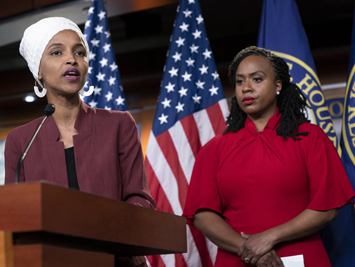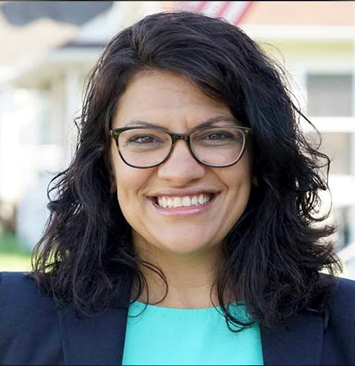No right to free speech - against Israel?
By Brian E. Muhammad -Contributing Writer- | Last updated: Aug 6, 2019 - 1:46:04 PMWhat's your opinion on this article?

Palestinian refugee children play outside their houses at Khan Younis refugee camp in southern Gaza Strip Aug 8, 2017. The BDS movement is modeled after the anti-apartheid strategy that targeted White minority rule in South Africa by pushing an international boycott and business divestment to force change.
|
America boasts of being a land where freedom of speech and freedom to protest are respected. Yet, when it comes to Americans criticizing a foreign ally, the Zionist state of Israel, and lifting their voices for Palestinian rights, these constitutional rights and values are compromised.
Freedom of speech in America has come under attack with efforts by some federal lawmakers to curtail activists and rights groups seeking to boycott, divest, and sanction Israel for oppressive policies toward its Palestinian population.

Rep. Ilhan Omar, left, plans to introduce a bill supporting a movement to boycott Israel over its actions toward Palestinians. Congresswoman Ayanna S. Pressley (right) also attended the announcement.
|
Rep. Ilhan Omar recently introduced a resolution designed to support the right to boycott and the right to exercise free speech. It opposes unconstitutional legislative efforts to limit the use of boycotts to further civil rights at home and abroad and urges Congress, states, and civil rights leaders from all communities to preserve freedom of advocacy for all by opposing anti-boycott resolutions and legislation.
“The Supreme Court has repeatedly upheld the right to boycott as an essential form of free expression,” her resolution reads. It was introduced in the House on July 23.
In mid-July, a congressional resolution overwhelmingly passed the House in a 398-17 vote condemning the global Boycott, Divestment and Sanction Israel movement, also known as BDS. Those who voted against that measure warned it threatens free speech and the right to boycott.

Rashida Tlaib, American politician and attorney. She is the first Muslim American woman to serve in the Michigan Legislature.
|
“Boycotts have been fundamental to civil rights and social justice movements throughout our country’s history, dating back to the Boston Tea Party,” said Rep. Omar (D-Minn.), one of two Muslim women in the U.S. House of Representatives.
Rep. Omar was one of 17 nay votes on the pro-BDS resolution and led several members of Congress, including John Lewis (D-Ga.) and Rashida Tlaib (D-Mich.), in introducing a resolution affirming all Americans have the right to participate in boycotts and exercise political speech as protected by the Constitution.
The Muslim lawmaker is the first Somali-American to serve in Congress. Rep. Tlaib is the first Palestinian-American to serve in Congress. Both are outspoken supporters of the right to boycott, divest and engage in sanctions and protest injustice.
“I stand before you as the daughter of Palestinian immigrants, parents who experienced being stripped of their human rights, the right to freedom of travel, equal treatment,” Ms. Tlaib said, during a congressional hearing. “So, I can’t stand by and watch this attack on our freedom of speech and the right to boycott the racist policies of the government and the state of Israel.”
“Our resolution isn’t about any particular movement—it simply resolves that the tactic itself must be preserved. We must not let our political disagreements impede the rights of our fellow citizens. It is a hallmark of our democracy and it deserves to be affirmatively protected by this Congress,” Rep. Omar said.

Activists from the Boycott, Divest and Sanctions movement against Israel, BDS, chant slogans and carry a placard with defaced pictures of U.S. President Donald Trump and Arabic that reads: “American Imperialism is the people’s enemy,” during a protest in front of the German representative office, in the West Bank city of Ramallah May 22. German lawmakers approved a resolution denouncing the BDS movement last Aug. 2, describing its methods as anti-Semitic and reminiscent of Nazi-era calls to boycott Jews.
|
“It’s not a bill, it’s a resolution … basically what it means is there’s no enforcement, it’s a statement of principle,” explained Phyllis Bennis, a fellow at the Institute for Policy Studies, in a telephone interview with The Final Call.
“It’s putting the House on record as being against BDS,” Ms. Bennis added. “We hate BDS, we don’t like BDS; you shouldn’t do BDS, is what they are saying.”
And, she explained, the earlier pro-Israel resolution is not an enforceable federal bill, but could help fuel anti-BDS legislation on city and state levels. “It gives them the right to say, ‘well Congress says that BDS is anti-Israel … therefore its fine for us to pass legislation that does criminalize support for BDS,” Ms. Bennis argued.
There are 27 states with anti-Boycott, Divestment and Sanction laws designed to penalize Americans for their political views. According to the American Civil Liberties Union, more than 250 million Americans, or 78 percent of the population, live in states with anti-boycott laws or policies.
The local laws, for example, can compel state contractors to take a public stance on a contentious political issue. A Texas law prohibited state agencies from contracting with, allocating public funds toward, and investing in, companies that boycott Israel. The law requires state employees and contractors to certify in writing that they will not engage in such boycotts during their term of employment.
Federal courts in Texas, Arizona and Kansas blocked similar state laws in response to First Amendment challenges in lawsuits filed by groups like the American Civil Liberties Union.
The state laws are companions to a larger systematic effort to curtail criticism of Israel despite the encroachment on freedom of speech rights in America.
The BDS movement is modeled after the anti-apartheid strategy that targeted White minority rule South Africa by pushing an international boycott and business divestment to force change. The BDS movement seeks to pressure the Israeli government to end discrimination against Palestinians, permit Palestinian refugees to return to their homes and comply with international rights law.
The global BDS movement was launched in 2005, when a coalition of civil rights groups, non-governmental organizations, and faith groups issued a statement, calling on people of conscience to non-violently resist Israeli occupation and discriminatory laws.
Israeli accountability is a political powder keg among U.S. lawmakers whether they are Republican or Democrat. Fear of powerful lobbyists for the Jewish state is bipartisan, said analysts.
For years Washington has given Israel wide latitude in dealing with the occupied territories of the West Bank and Gaza Strip, even when its actions were at odds with stated U.S. policy.
There have been efforts by American lawmakers to marginalize the BDS movement since its inception. The pro-Israel House resolution, which passed July 15, is part of an ongoing battle by influential political supporters of Israel to marginalize critics of Israel’s human rights record and repression of Palestinians and other ethnic minority groups in the country.
But the language of the resolution targeted the BDS movement and its co-founder, Omar Barghouti, by name. “Sadly, H.Res. 246, which fundamentally mischaracterizes our goals and misrepresents my own personal views, is only the latest attempt by Israel’s supporters in Congress to demonize and suppress our peaceful struggle,” said Mr. Barghouti, in a July 29 Op-Ed published in the Nation.
Although the resolution was heavily supported, Ms. Bennis noted, it comes at a time when the “trajectory of U.S. opinion on Israel-Palestine is changing direction,” particularly on college campuses and among political progressives in favor of Palestinian rights. “The long-term power of the pro-Israel lobbies—Christian, Jewish, and others—is steadily diminishing,” Ms. Bennis said.
The ACLU warns anti-BDS congressional action that benefits Israel and that “seeks to silence this speech is contrary to our Constitution and the rights of all people living in America.”
INSIDE STORIES AND REVIEWS
-
-
About Harriett ... and the Negro Hollywood Road Show
By Rabiah Muhammad, Guest Columnist » Full Story -
Skepticism greets Jay-Z, NFL talk of inspiring change
By Bryan 18X Crawford and Richard B. Muhammad The Final Call Newspaper @TheFinalCall » Full Story -
The painful problem of Black girls and suicide
By Charlene Muhammad -National Correspondent- » Full Story -
Exploitation of Innocence - Report: Perceptions, policies hurting Black girls
By Charlene Muhammad -National Correspondent- » Full Story -
Big Ballin: Big ideas fuel a father’s Big Baller Brand and brash business sense
By Bryan Crawford -Contributing Writer- » Full Story






 Click Here Stay Connected!
Click Here Stay Connected!








